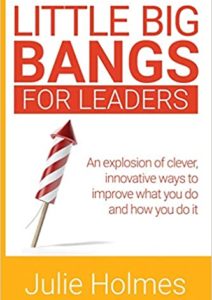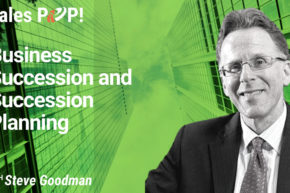Ask Effective Sales Questions
Million Dollar Sales Questions can be used to connect, direct, and sell more effectively. Julie Holmes discusses how to ask the best sales questions in this expert sales interview with John Golden.
This expert sales interview explores sales questioning:
- Why questioning is important
- Good questions versus bad questions
- Introductory questioning
- The Five Goals of Sales Questions
Why Sales Questions are Important:
When talking about selling, the number one thing that salespeople can do to close deals isn’t selling. Rather, it’s asking questions that allow you to learn more about the prospect and their needs. Understanding this will tell you the exact right time to offer the solution. “Questions are the best way to take the buyer on the journey that they want to be on,” said Holmes. They will know that they are being fully engaged with, and at the end of the day, when the salesperson offers up a product, it will be exactly what they need.”
Million Dollar Questions vs. Ten Cent Questions:
Like with most things, there is a right way and a wrong way to ask questions. All too often, salespeople are asking ten-cent questions, like: “Do you like this feature?” or “Would you like to buy this now?” These questions aren’t effective because they are very focused on the salesperson and not the buyer. Ten cent questions are a sales tool. Million dollar questions, however, aren’t sales tools. They are learning and engaging tools.
Question the Questions:
Before you start preparing your questions, it’s important to have strategic intent, and understand the function of the questions themselves. Rather than going in with a long, generic list of questions, a good salesperson is going to think strategically about what they are going to ask. They consider what they are trying to achieve from the conversation, and what information, answers, and guidance are needed from the prospect. This intentionality helps the salesperson create questions that are relevant, and will help guide the sales process in the right direction. “If you don’t know what you want to get, it’s going to be really hard to get it,” said Holmes.
Opening Questions:
Some great questions that you can ask in the initial stages are about the prospect’s business needs, and about the pain that they are experiencing. For example, if you are selling a CRM system, you might ask: “Tell me about your biggest challenges or biggest frustrations with CRM?” or “What have you been using to try and fix the problem up until now?” This helps give insight into the past and current problems that the buyer is having with their CRM software. Then, you could ask: “What do you want it to look like?” The answer will give you an understanding of their goals, and what they want their CRM to look like in the future.
Goal 1: Building Rapport
There are five different goals of questioning when working in sales. The first goal is to build rapport and set up relationships. These questions include things like: “Tell me about yourself?” “Tell me about your business?” “How do you like to work with salespeople?” “What are the best ways for us to communicate?” This not only sets the foundation for your relationship, but you also solidify your role as a salesperson and convey that you are willing and wanting to understand your client’s specific needs.
Goal 2: Understanding the Buyer’s Style
You can understand the buyer’s style with questions that determine what type of data and information the buyer connects with best. There are data-driven buyers, story-driven buyers, ego-driven buyers, and others, and if we understand what their motivations and their triggers are, we can ask questions and communicate with them in a way that really connects with their style. This honors the prospect’s individuality and takes into consideration that they have specific needs and preferences.
Goal 3: Understanding the Buyer’s Priorities and Values
What is most important to your buyer? Why are they looking to buy right now? Is it to save face, or to leave a legacy at their organization, or to find a new solution? There are many questions we can ask surrounding this topic to understand their motives on a deeper level. If you don’t explore what your buyer’s priorities are, you could press them too hard or miss an opportunity to press them, or even misguide your clients. You might even waste time chasing buyer’s who aren’t ready to buy.
Goal 4: Understanding the Landscape
Understanding the landscape of your prospect’s organization is also vital. You can get information on this by asking things like, “Who all is involved in this process?” “Who would you say are the major influencers in this selection process that you’re going through?” “How long does a sales process usually take at your organization?” Understanding the landscape of the transaction is helpful to know when to ask for the sale, if there is an important timeline, and other information that helps you schedule and structure the sales process.
Goal 5: Identify fear, uncertainty, and doubt
These kinds of questions help you find the blockers and objections that your prospect might have. “A salesperson’s primary function is to overcome fear, uncertainty, and doubt,” said Holmes. “You can do everything else right in the sales cycle, but if you can’t do that, you can’t close.” In many instances, sometimes the best way to identify these fears is to simply ask. It can be as straightforward as, “what are your biggest concerns about this deal or product?” This gives you the opportunity to address the fears, and help reassure the buyer that you can handle their concerns. More often than not, the prospect will be relieved that they can trust you.
To learn more about asking sales questions, watch the expert sales interview!
About our Host:
John is the Amazon bestselling author of Winning the Battle for Sales: Lessons on Closing Every Deal from the World’s Greatest Military Victories and Social Upheaval: How to Win at Social Selling. A globally acknowledged Sales & Marketing thought leader, speaker, and strategist. He is CSMO at Pipeliner CRM. In his spare time, John is an avid Martial Artist.





Comments